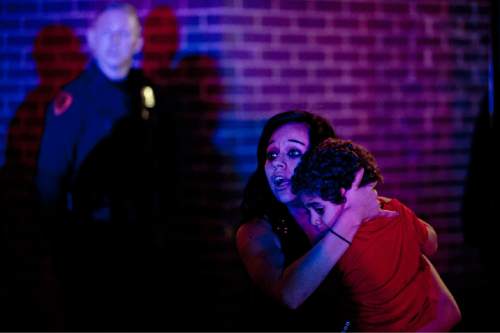This is an archived article that was published on sltrib.com in 2016, and information in the article may be outdated. It is provided only for personal research purposes and may not be reprinted.
Becca Monson was planning to pick up her boyfriend after a night at the movies with their young son when she saw the flashing of police lights.
She picked up the child and ran through the crowd near 200 South and Rio Grande Street, where bystanders were facing off with police after an officer-involved shooting outside a homeless shelter.
Suddenly Monson's friend Selam Mohammad pulled her aside and told her: "It's your man that got shot."
"I was texting him," Monson recalls, crying. "I almost got him, and then he's shot."
Abdullahi Omar Mohamed, 17, was back in surgery Tuesday, three days after his shooting led to a heated confrontation involving about 100 officers who were dispatched to the scene. It also prompted about 500 protesters to take to the streets Monday amid talks between city officials and police reform advocates.
Police and witness accounts differ in their descriptions of events leading to the shooting. Police say Abdullahi Mohamed and another man were using "metal objects" to attack an unarmed victim when officers shot Abdullahi Mohamed.
But Selam Mohammad said the two were fighting each other with pieces of a broken broom — and that Abdullahi Mohamed was fighting in her defense.
Monson said she had dropped off Abdullahi Mohamed and Selam Mohammad on Rio Grande earlier that day so they could visit a friend at the shelter. While they were there, Selam Mohammad said, a man on a bicycle rode up and said something "bashing on" her.
"That's when my friend Abdi asked him what he said ... and the guy got hostile," Selam Mohammad recounted in a talk at Monday's rally. The man was bigger than Abdullahi Mohamed, Selam Mohammad said. Abdullahi Mohamed picked up a broomstick and broke it on a pole, Selam Mohammad said. The unidentified man picked up the other half of the stick and walked into the street, with Abdullahi Mohamed close behind, Selam Mohammad said.
"They started fighting," Selam Mohammad said. "I tried to break it up."
Two Salt Lake City police officers had been called to the area on an unrelated complaint and "were alerted" to the fight, police have said. Selam Mohammad said Abdullahi Mohamed's back was facing the officers when they arrived.
"I turned around, and I seen two police officers already with their guns out," Selam Mohammad said. "They didn't even say anything. The Caucasian male ... dropped his stick. At the same time, the cops said, 'Drop it.'
"I called Abdi's name, and he was turning around to me, but he didn't even get to fully turn around before the cops shot him."
Police, on the other hand, have said officers arrived to find Abdullahi Mohamed and another man "attacking a male victim." The other man dropped his weapon and fled, police confirmed Tuesday.
But when ordered to drop the weapon, police wrote, Abdullahi Mohamed "continued to advance on the victim and was shot by officers."
Interim Chief Mike Brown has declined to discuss the alleged victim, whether he was injured or treated by emergency responders, who he is, his relationship to Abdullahi Mohamed and the other man, or whether he was interviewed.
Brown also would not identify the officers who shot Abdullahi Mohamed or say how long they had been employees of the department.
The department on Tuesday did not answer The Tribune's request for expedited release of dispatch recordings from Saturday night, and police have declined to release footage from the officers' body cameras.
Throughout the week, city officials have stressed their commitment to transparency. But members of Abdullahi Mohamed's family said withholding the body camera footage does not support that goal.
"We're waiting on the video and to hear what happened," said Abdullahi Mohamed's cousin Muslima Aden. "I think we have a right to see that video because we are his family. What is there to hide?"
Brown met with Aden and other family members on Sunday, escorting Abdullahi Mohamed's mother to the boy's hospital bed.
"He was crying and apologizing," Aden said. "But 'sorry' doesn't fix anything. 'Sorry' doesn't change the fact that he got shot three times."
The family has not been allowed to visit again, Aden said, but they have learned his condition has stabilized.
Abdullahi Mohamed and Aden spent their early childhood with their Somali families in a refugee camp in Kenya, Aden recalled.
"There wasn't enough food for the family," she said. "No good shelter and medicine." Water was available for one hour every day.
They moved to Utah when Abdullahi Mohamed was 6. Aden describes him as "a great person" who struggles with anxiety and a "bad past."
Monson said their son is 4, and Abdullahi Mohamed moves between their home in West Valley City and his family's in Salt Lake City.
"My son has been through tragedy," Monson said. "Our boy's getting hurt. I'm getting hurt."
Unified Police are investigating the shooting alongside internal affairs and training units for Salt Lake City police, a civilian review board and the Salt Lake County district attorney's office. The city's Human Rights Commission planned a "community listening session" to discuss the shooting at 7 p.m. Wednesday in the Marmalade Library Branch, 280 W. 500 North. More than 200 protesters have said they will attend a "pack-in" of the Salt Lake City Council meeting March 15.
Meanwhile, another person was shot Tuesday night by police in West Valley City. Investigators did not know the man's condition as of press time.
ealberty@sltrib.com Twitter: @erinalberty
Tribune reporter Michael McFall contributed to this story.



